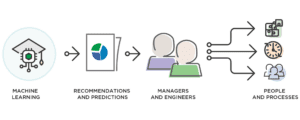
At the airport for an early flight, returning home after a speaking engagement, I was having a moment, feeling “tweepy” (my new word for tiredness that makes me weepy) as I stood in line to order breakfast. The trip had been a busy several days on top of a difficult year. The woman taking my order looked directly at me, smiled, and wished me a nice day. Her words were not remarkable but delivered with such utter sincerity, with light in her eyes, that they touched me just enough to lift my spirits. After eating I returned to the counter to thank her for making a difference. This may seem like an insignificant moment, but most of life is a series of small moments punctuated by a few big ones, some stupendous, others shattering. In a year heavy with crushing moments I’ve gained appreciation for the gifts of kindness, and this small exchange shone a light for me on why they matter, what I want to delegate to AI, and what remains uniquely human.
In my last commentary I argued that AI lacks what I call the 3C’s: context, collaboration and conscience. The challenges I’ve faced in the last year have reinforced the importance of two additional fundamentally human capabilities AI lacks: connection and compassion. As appetite for AI continues to grow at an astonishing pace, navigating the boundaries of what to delegate to AI and what to preserve for humans is essential.
The Appeal of Delegating to AI
AI is a tool designed by humans to do things it can do better or we cannot or do not want to do. Automation powered by AI takes over tedious grunt work involved in areas like supply chain procurement, with chatbots negotiating routine contracts with suppliers, saving money and freeing up time for professionals to handle more complex deals.
AI thrives on large volumes of data, so it can scale far beyond our cognitive capacity to crunch through reams of information quickly and synthesize the results. Googling now often places a generative AI result at the top of the page, a single answer from searching and summarizing the most relevant information. It can find and learn from patterns in big data sets to make predictions, such as when a machine is likely to fail in a factory, which external signals will most impact a demand forecast, or what actual lead times for parts will be.
AI has potential to reduce bias, since people can make inconsistent and subjective decisions based on personal opinions, so there is promise for its application in areas like hiring, lending, and medical diagnosis. But these same areas of AI promise also show risk. Since bias is primarily a problem of the underlying data reflecting existing human bias, efforts must be made to leverage AI’s strengths and mitigate its pitfalls. AI fairness is thorny, but I am hopeful that combining human and AI strengths for some of these decisions can make them more consistent and objective.
In addition to these applications of AI’s strengths, it doesn’t get tired (or weepy), irritable, bored or overwhelmed. On a different trip during another tweepy moment, exacerbated by a cascading series of flight cancellations and reroutings preventing me from getting home that night, I had to make a decision between a variety of unattractive flight and hotel options. I would have loved to simply delegate to AI finding me a room and getting me home.
The appeal of delegating to AI is borne out by data. The US National Bureau of Economic Research reported last month that Generative AI is already on track to outpace the speed of adoption of the internet and PCs. ARK Investment Management found that every four months the cost of operating AI models drops by half, beating the famous Moore’s Law on chip costs by a factor of 4-6 times. New research by Morgan Stanley finds that 50% of AI projects are delivering and 40% exceeding expected ROI. In short, delegating to AI is moving fast and making an impact.
Never Delegate Understanding – the Limits of AI
Charles and Ray Eames designed some of the most iconic furniture of the 20th century through a deep study of an object’s purpose, a process that led to their famous adage, “Never delegate understanding.” Their philosophy was grounded in foregoing assumptions about how things worked in favor of learning for themselves. We delegate understanding when we expect tools and technology to solve all our problems and surrender our own expertise. As researchers have found, we still don’t fully understand the boundaries of AI’s capabilities, a phenomenon they call the jagged technological frontier. Their experiments showed how blind trust in AI’s results was a delegation of understanding that actually led to a 19% dip in performance.
The problem is that as dazzling as generative AI can be, it doesn’t “understand,” it is a probabalistic sentence completion machine. It responds to queries based on AI models, not comprehension. Language has structure and rules, but human emotion is far less predictable. AI techniques like sentiment analysis can identify the emotions in language to provide insights for certain purposes like customer service or targeted marketing, but these methods don’t achieve true emotional intelligence, they only barely scratch the realm of human feelings, which defy rationality.
The Importance of “Flesh and Breath”
My father spent the last year and a half of his life in a skilled nursing facility, and while visiting him I was saddened to observe so many elder adults languishing alone, because research is clear that we are wired for connection. This exposure piqued my interest in so-called social or care robots that can mimic pet therapy, visit residents, facilitate social interactions, offer tailored suggestions for healthy behaviors like exercise, and more. While I in no way see these devices as substitutes for humans, I’m open to anything that might plug the dike of what former US Surgeon General has called “an epidemic of loneliness.”
And yet I understand the response of a friend who spent many years working with the elderly – she is adamant that stemming loneliness requires “flesh and breath,” not electronic devices. Her reaction points to the limits of AI – given enough data, it can analyze facial expressions and voices to detect emotions and even respond, but it doesn’t understand, because it doesn’t feel. And the ability to feel, in spite of the inevitable heartache, is what fuels connection and compassion.
The Power of Compassion and Connection
My circumstances over the last year forced me to discuss very personal details with strangers as well as colleagues. The kindness I’ve received in response has been astounding. People I hardly knew checked in to ask how I was doing. A colleague on maternity leave sent regular doses of baby photos. One man I know professionally but have never even met in person offered to host me at his house in New Hampshire so I could hike, knowing it is both a hobby and solace. My compassion cup has been overflowing.
When I opened to the door to my own experience, people walked in to share their own stories of heartbreaking challenges, some past, some present. I heard tales of fire, death of a parent, loss of work, sexual assault, mental illness, addiction, degenerative disease. People shared understanding of my pain and a common message that I will make it, no matter how hard it may seem now. They didn’t delegate understanding but created it by listening, greeting me with compassion, and walking alongside me in sharing their own stories, creating connection we can’t delegate to AI.
Call centers are heavily studied in part because of the abundance of data, and one area of research is how to improve customer service through analyzing emotions callers express in order to offer employees guidance in responding more effectively. I’m all for anything that can make these calls better, but the reason my small moment in the airport warmed my heart is because this woman’s customer service was exemplary, not based on a script but borne of authenticity and compassion, brimming over and creating connection. AI is impressive in its abilities to help manage crew schedules, design optimal flight paths, detect plane safety issues, predict parts needed for maintenance and reduce emissions from fuel, but in my tweepy airport moment I was grateful for compassion and connection delivered via flesh and breath.
 Polly Mitchell-Guthrie is the VP of Industry Outreach and Thought Leadership at Kinaxis, the leader in empowering people to make confident supply chain decisions. Previously she served in roles as director of Analytical Consulting Services at the University of North Carolina Health Care System, senior manager of the Advanced Analytics Customer Liaison Group in SAS’ Research and Development Division, and Director of the SAS Global Academic Program.
Polly Mitchell-Guthrie is the VP of Industry Outreach and Thought Leadership at Kinaxis, the leader in empowering people to make confident supply chain decisions. Previously she served in roles as director of Analytical Consulting Services at the University of North Carolina Health Care System, senior manager of the Advanced Analytics Customer Liaison Group in SAS’ Research and Development Division, and Director of the SAS Global Academic Program.
Mitchell-Guthrie has an MBA from the Kenan-Flagler Business School of the University of North Carolina at Chapel Hill, where she also received her BA in political science as a Morehead Scholar. She has been active in many roles within INFORMS (the Institute for Operations Research and Management Sciences), including serving as the chair and vice chair of the Analytics Certification Board and secretary of the Analytics Society.



















 Note: Today’s post is part of our “Editor’s Choice” series where we highlight recent posts published by our sponsors that provide supply chain insights and advice. Today’s article is from Lucas Systems and highlights the benefits of machine learning in the warehouse.
Note: Today’s post is part of our “Editor’s Choice” series where we highlight recent posts published by our sponsors that provide supply chain insights and advice. Today’s article is from Lucas Systems and highlights the benefits of machine learning in the warehouse.
